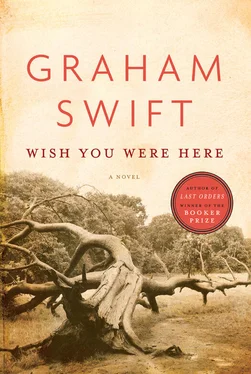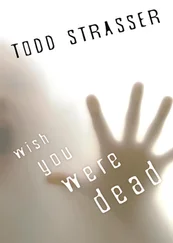Only moments ago he’d actually wanted to be in the hearse. That was his rightful place. Having held that coffin and having wanted not to let go, how could he be afraid now of being followed by his own brother? But that was the point. He’d separated himself from his brother (and what was new about that?). He had to be in this damn Cherokee. Therefore he had to avoid the hearse and its pursuing indignation. To put distance in between.
But he’d hardly gone five miles, and he couldn’t have said where it was — it was somewhere in the unknown heart of England — before he’d had to pull over into a lay-by while a series of great, wracking shudders made him, stopped as he was, hang on to the steering wheel as if he might wrench it off.
BUT IT WOULDN’T have worked anyway, would it? If he’d had to get up and make a speech and had said that Tom had always been stirred by those two Luxton boys of long ago. Because that would have been like saying that Tom had really wanted to go off and get himself killed as well. As he had done. And what kind of war, exactly, had Tom been going off to fight when he’d slipped out of Jebb Farm thirteen years ago? What kind of war, exactly, had he even been fighting now?
At least those two Luxton lads had known the score. Maybe.
It wouldn’t have worked because it wasn’t true. But it wouldn’t have worked, anyway, because Jack Luxton could never have got up to make a speech — before lords, ladies and colonels — even to save his own damn life.
He looks now through the rain-spattered cottage window and remembers pulling up in the car, among strange, bare fields, just to shake and weep. Tom was the traitor, my lords and ladies, Tom was the deserter, the runaway. Running away from the war against cow disease and agricultural ruin. And against his own embattled father.
Good luck, Tom.
One morning, at milking (by then they had a sort of herd again and they could sell the milk), Tom had told him the whole story. About his trip to Exeter to buy a suit, more than a year before. About how he had it all planned now, for his eighteenth birthday. His own man. December 16th. Bugger Christmas. And bugger birthdays, if it came to it. What kind of birthday did anyone get, these days, at Jebb Farm?
The cows had twitched and steamed in the stalls. It would have been this time of year — November, not so long after Remembrance Day, when Tom would have worn that suit, only the second time for the purpose.
‘This is just for your ears, Jack.’
‘And the cows’,’ Jack might have said if he’d had the quickness of mind.
Though Jack had needed to think quickly, and seriously, enough that morning. And one of his first thoughts was that Tom hadn’t had to say a thing. Tom might have just cleared off, according to his plan, leaving him, Jack, as surprised and left in the lurch as their father was going to be. But Tom was telling him now, so Jack had thought, because Tom was a brother. He’d been saving it up and it had been a matter, perhaps, of careful timing, but Jack didn’t want to go into that. Tom was telling him now.
And that meant that Tom was really putting before him a whole set of alternative positions. Like the position of saying: You can’t do this, Tom, you can’t bloody do it. Or the position of simply ratting on him to his father. Or the position of thinking why hadn’t he, Jack, done something like this years ago and left Tom to Michael’s mercy? Or the future position (the not-so-distant future, it now seemed) of being left, himself, to Michael’s mercy and having to pretend he’d never known a damn thing about it.
But none of these theoretical positions had really exercised Jack much at the time, because of the overriding position Tom was putting him in, which was the position of trust. Tom hadn’t had to say a word. But what are brothers for?
The steady hiss and clank of the machinery, the familiar parade of swollen udders and the splat of cow shit had seemed, for Jack, to say that though Tom had just announced, in effect, a division, a parting in their lives, nothing was altered, everything would stay the same. Or the same as the cow disease and the price of calves had left it. Or the same for him at least, Jack. Since he wasn’t going anywhere.
His own man.
He’d said, not stopping in his work, ‘I understand, Tom. I understand what you’re telling me.’ In the middle of milking you can’t pause, sit back and say, ‘Let’s talk this over properly.’ Maybe Tom had reckoned on that.
They’d both had to raise their voices through the sound of the machinery. That noisy old machinery. It was like speaking in whispers while shouting. Then after some moments, when the last udders were being relieved of their burdens, he’d said, ‘Okay, Tom. You can rely on me. Your secret’s safe with me.’
‘And with the cows,’ he might have said, if he’d had the wit for it.
Jack could never have got up to make a speech if he’d tried. But Jack had thought he could never write the letters he’d had to write, more or less a year later, to Tom, not even knowing then where they would find him (or, now, if they’d reached him at all). About the death of Michael Luxton. Which had required an inquest. How did you write to your brother about such a thing? But not only that. About the fact that Michael had made a will, as farmers do, and in his will, according to its latest revision, he’d left everything (such as it now was) to his first-born. No mention of his second.
‘All yours, Jack.’
Tom had never actually said those words. Or said, in some other form, that it was the deal between them — if he was to go and Jack was to stay. But Tom had never written back to him, or shown up for the funeral, for whatever reasons, perhaps simply practical or perhaps — uncompassionate. There’d been two letters to write to Tom. One about the death and the inquest. One to tell him the verdict (though was there any doubt?) and to tell him, consequently, the details of the funeral. And of the will.
Babbages, Barnstaple. November, 1994. The month, so it seemed, of funerals. And Ellie had been there — had helped him, steered him through it all, been at his side then. But no Tom, for whatever reason, perhaps merely military. And no word from him. And hadn’t that settled the matter? Wasn’t that even Tom’s way of saying it again — what he’d never actually said in the first place? All yours, Jack — and you’re welcome to it.
And Ellie had said, said it more than once: ‘Forget him.’
Tom was the deserter, the traitor? But if so, Jack was a traitor too, for covering for him. Or Jack was doubly loyal. To Tom, for not betraying him, and to Dad, or to the farm, for staying put himself.
One late December afternoon — it was the eve of Tom’s eighteenth birthday — Tom and Jack had spoken to each other, knowing that this was the moment for their saying goodbye. Tom was to slip out at three the next morning (Michael could sometimes stir at four, even in December) and Jack was to pretend that he’d been sleeping, as he usually did till his dad’s stirrings roused him, like a log.
They were once again in the milking parlour, making sure they were out of their father’s earshot. Jack at this point had asked Tom to write to him and let him know where he was. Tom had said of course he would. And so he had, using the non-interceptible method of sending the letter to Jack care of the tiny and soon to be closed subpost office in Polstowe (where their mother had once been a girl), and letting him know the postal particulars by which he, Jack, could write to him in future. But that was all Jack ever heard from Tom after he left.
Tom said he would just take the clothes he’d be in — several layers, for the cold — and a backpack with extra stuff. It would soon be the army’s job to clothe, feed and house him. He’d hoof it through the night, then get the first bus to Exeter. He’d already, by the time they’d spoken, hidden a pack of sandwiches and a thermos inside the Big Barn at the far side of the yard. It was like the usual rations he might have taken with him to do some job on the far side of the farm. He’d breakfast on the march.
Читать дальше








![Питер Джеймс - Wish You Were Dead [story]](/books/430350/piter-dzhejms-wish-you-were-dead-story-thumb.webp)



